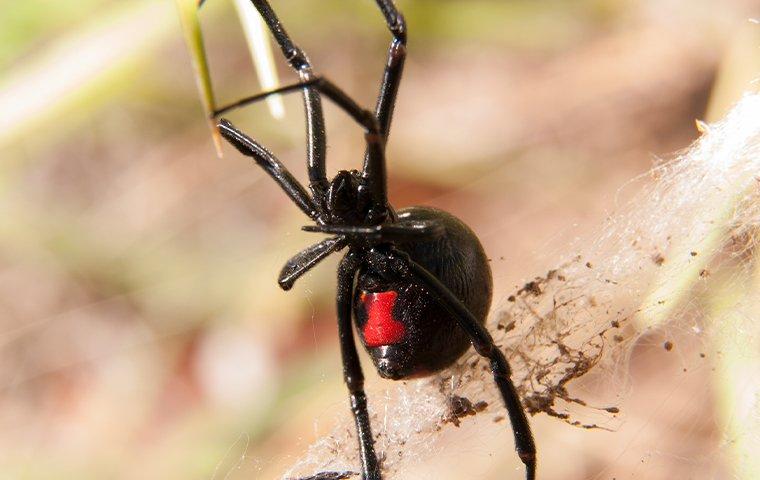What are Spiders?
Spiders are arachnids and have two body regions, chelicerae (fangs), and eight legs. They come in a variety of shapes, sizes, and colors, and lack antennae and wings. Spiders in Memphis are beneficial pests that hunts and feeds on garden pests and other nuisance insects. Most spiders are naturally shy and reclusive, staying out of sight from people and predators.
Listed below is a quick description of the spiders most familiar to the Memphis Metro area:
Black widow spiders
These spiders have a unique, red hourglass-shaped marking on the underside of their abdomens, and they may also have light red or white markings on their abdomens and backs. Their round bodies are shiny and black, and their legs are very thin.
Brown recluse spiders
These spiders range in color from yellowish-gray to black, and their abdomens are covered in gray hair; their legs are a darker color than their bodies. Additionally, brown recluse spiders have a distinctive violin-shaped pattern on the top of their bodies, and three pairs of eyes uniquely arranged in a semicircle.
House spiders
These are the most common spiders found living in homes and businesses throughout our area. House spiders have round abdomens and vary in color but are usually yellowish-brown, with distinctive, dark chevron markings on their bodies and legs.
Are spiders dangerous?
Though spiders are not sweet and cuddly creatures, the truth is that most household invading spiders pose little risk to people. Spiders spend most of their time hidden. If contact is made with one and a bite occurs, the venom of a nuisance spider is not strong enough to cause health problems in most people.
The vast number of spiders that people come into contact with are harmless, but a handful of spider species living here in Memphis and throughout the United States are considered dangerous to people. The black widow and the brown recluse are both examples of dangerous spiders, as their venom is strong enough to pose a health threat.
Why do I have a spider problem?
Most yards, unfortunately, make the perfect habitat for spiders. If there are large populations of insects on your property, you will have a problem with spiders. Like other pests, spiders are follow their food and will often chase insects indoors. In addition to food, these spiders like properties with lots of safe, secluded shelter to burrow or build webs.
Where will I find spiders?
Most spiders create webs to either capture their prey or use as a place to rest, while others don’t spin webs at all; they burrow into the ground under rocks, trees, or woodpiles. Web-building spiders place their nests in bushes, trees, woodpiles, under decks, under roof eaves, and in doorways. Spiders are also very fond of building their webs in the rafters of outbuildings like barns, sheds, and garages. Those that have made their way indoors can usually be located in attics, basements, closets, under pieces of upholstered furniture, and other quiet, out-of-the-way places.
How do I get rid of spiders?
If you are looking to get rid of spiders from your Memphis property, the professionals at Dart Pest, Lawn & Wildlife are here to help. Our EPA-trained and certified technicians will solve your spider concerns once and for all! Our effective home pest control services protect people, homes, and yards from spiders and our area's most common pests. To learn more about our exceptional residential or commercial pest control services, reach out to Dart Pest today!
$425.00 Initial Treatment
$75/month
*Prices vary based on sizing of house. Prices above are for houses under 2000 sqft.
Must purchase one year spider control plan.*
How can I prevent spiders in the future?
Utilize the following tips to help keep spiders out of your Memphis property:
- Cut tree branches, shrubs, and bushes away from the exterior of your home or business.
- Remove debris and clutter from your property and yard where spiders can hide.
- Clear clogged gutters and downspouts.
- Keep the grass cut short.
- Make sure that screens are entirely intact.
- Eliminate open water sources inside and outside your property.
- Seal up openings in the foundation, exterior walls, and roofline of your property.
- Place gardens and woodpiles a distance away from the outside of your home or business.








